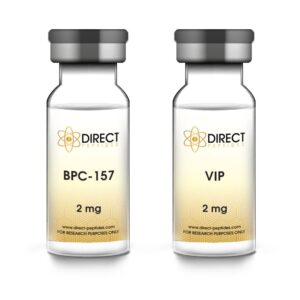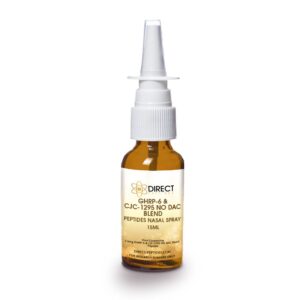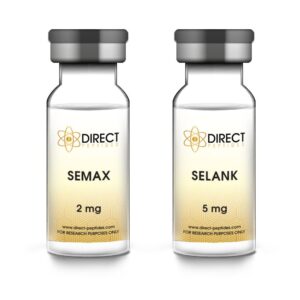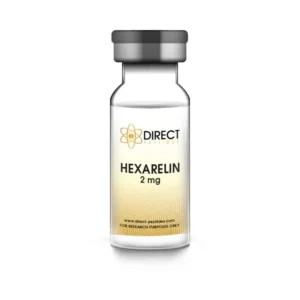
Revealing the Power of Peptide Blend TB500 and BPC-157
Exploring The Research Opportunities for Peptide Blend TB500 and BPC-157 Netherlands Peptide therapy has gained increasing popularity over the years,
Dementia, a condition characterized by cognitive decline and memory loss, affects millions of individuals worldwide. As Netherlands researchers strive to uncover new avenues for treatment and prevention, peptides have emerged as a promising area of study. In this comprehensive article, we delve deep into the potential of peptides in combating dementia. From exploring various peptide names to highlighting their advantages, we shed light on how these tiny compounds could hold the key to fighting this debilitating condition.
Defining Dementia:
Dementia refers to a broad category of neurological disorders that cause a decline in cognitive abilities. It affects memory, thinking, behavior, and daily functioning, severely impacting the quality of life for those affected.
The Growing Global Burden:
Dementia poses a significant challenge to healthcare systems worldwide due to its prevalence and associated economic burden. With an aging population, the number of dementia cases is expected to rise, necessitating innovative approaches to address this crisis.
Unveiling Peptides:
Peptides are short chains of amino acids, often considered nature’s building blocks. These small molecules play crucial roles in various biological processes, including cell signaling, hormone regulation, and immune system function.
Peptides and Dementia: Exploring the Connection:
Netherlands Research suggests that certain peptides hold promise in addressing the pathogenesis of dementia. Some notable peptide names include:
Aβ peptides are involved in the formation of amyloid plaques, a hallmark of Alzheimer’s disease. Netherlands Research suggests that targeting these peptides may help prevent plaque accumulation, offering potential therapeutic benefits.
Neuropeptides, such as VIP, are essential in neuronal communication and have been implicated in various cognitive functions. Netherlands Scientists are investigating their potential role in promoting neuroprotection and enhancing memory and learning. Explore VIP from Direct Peptides, available in vials, nasal sprays and pre-mixed pens.
Emerging Netherlands research suggests that VIP influences various aspects of dementia pathology, including neuroinflammation, neuronal dysfunction, and neurodegeneration. VIP acts through binding to specific receptors expressed in the brain, modulating neurotransmitter release, and exerting trophic effects on neuronal survival and function. By regulating the immune response and promoting neuroprotective mechanisms, VIP may have potential therapeutic implications for dementia management. Investigating the complex interplay between VIP and dementia holds promise for understanding disease mechanisms and developing novel therapeutic strategies aimed at mitigating cognitive decline.
GHRPs stimulate the release of growth hormone and offer neuroprotective effects. Early Netherlands studies suggest that GHRPs may improve cognitive function and potentially slow down neurodegeneration in dementia patients.
Researchers have explored the neuroprotective properties of GHRP-2 and GHRP-6, examining their ability to enhance cognitive function and mitigate neurodegenerative processes associated with dementia. Studies suggest that these peptides may exert positive effects on neuronal survival, synaptic plasticity, and neuroinflammation, potentially contributing to the prevention or treatment of cognitive decline. Check out GHRP-2 from Direct Peptides.
While further investigation is needed to fully understand the therapeutic mechanisms and clinical applications, the potential of GHRP-2 and GHRP-6 in dementia research holds promise. Researchers, healthcare professionals, and individuals interested in exploring this emerging field can find high-quality peptides such as GHRP-6 and related products at Direct Peptides.
Numerous studies have suggested that Hexarelin possesses neuroprotective properties that may benefit individuals suffering from dementia. It is believed to stimulate the release of growth hormone, leading to enhanced neurogenesis and neuronal survival. Furthermore, Hexarelin exhibits anti-inflammatory and antioxidant properties, which can potentially mitigate neuroinflammation and oxidative stress, both of which are implicated in the pathogenesis of dementia.
As researchers continue to investigate Hexarelin’s mechanism of action and its potential benefits, it holds promise as a potential adjunct therapy for dementia. However, further clinical trials are necessary to ascertain its safety, efficacy, and optimal dosage. Hexarelin is available online from Direct Peptides.
BDNF peptides play a critical role in neuronal growth, survival, and synaptic plasticity. By enhancing the production of BDNF, researchers aim to foster neurogenesis and promote brain health in individuals with dementia.
The profound impact of BPC-157 on brain-derived neurotrophic factor (BDNF) has attracted the attention of researchers worldwide. BDNF plays a pivotal role in neuronal growth, plasticity, and survival, making it a key factor in maintaining cognitive function. Studies have shown that BPC-157 exhibits potent neuroprotective properties by upregulating BDNF expression and promoting neurogenesis. Moreover, it exerts potent anti-apoptotic and anti-inflammatory effects, further contributing to its potential therapeutic benefits in dementia.
As Netherlands researchers strive to unravel the complexities of dementia and develop effective treatments, BPC-157 holds great promise as a novel approach. Its ability to mitigate neurodegenerative processes and enhance cognitive function make it an exciting area of exploration.
Nootropic peptides are known for their cognitive-enhancing properties. These compounds may improve memory, focus, and overall cognitive function, providing potential benefits for individuals with dementia.
According to Netherlands research, Selank exhibits promising neuroprotective properties, acting on various neurochemical pathways involved in memory formation, synaptic plasticity, and neurotransmitter regulation. By modulating the levels of brain-derived neurotrophic factor (BDNF), Selank promotes neurogenesis, strengthens synaptic connections, and enhances cognitive abilities. Additionally, the peptide demonstrates anti-inflammatory and antioxidant effects, which may further contribute to its potential therapeutic value in dementia.
Numerous preclinical studies have shown positive outcomes in animal models of dementia, highlighting Selank’s ability to improve cognitive impairments and reduce neuroinflammation. Although more extensive clinical trials are required to confirm these findings in human subjects, early research provides a strong foundation for further investigation. Selank research peptide is available in vials, nasal sprays and pre-mixed pens.
As Netherlands researchers continue to investigate new treatment options for neurodegenerative disorders, Semax has emerged as a promising candidate. This peptide is believed to modulate various neurochemical processes, including the regulation of neurotransmitters, neuronal survival, and synaptic plasticity. Preliminary studies suggest that Semax may enhance cognitive function, improve memory, and potentially slow down the progression of dementia. However, further research is needed to fully understand the mechanisms of action and establish its efficacy in clinical settings.
The potential of peptides and dementia research and treatment is an exciting frontier, offering hope for individuals affected by this debilitating condition. Through this comprehensive guide, we have explored the fundamentals of peptides, their connection to dementia, and promising peptide candidates. As Netherlands scientists and researchers work towards unlocking the full potential of peptides, Direct Peptides remains committed to supporting and contributing to this important field of study.
Remember, for the latest information on peptides and to explore our range of high-quality peptide products, visit Direct Peptides (https://netherlands.direct-peptides.com).
References:
[1] S.Passemard et al (2012) VIP-induced neuroprotection of the developing brain – Current Pharmaceutical Design 2011, Volume 17, Number 10
[2] L.M.Frago et al (2002) Growth hormone (GH) and GH-releasing peptide-6 increase brain insulin-like growth factor-I expression and activate intracellular signaling pathways involved in neuroprotection – 2002 Oct;143(10):4113-22
[3] K.G.Brywe et al (2005) Growth hormone-releasing peptide hexarelin reduces neonatal brain injury and alters Akt/glycogen synthase kinase-3beta phosphorylation – Endocrinology 2005 Nov;146(11):4665-72.
[4] P.Sikiric et al (2016) Brain-gut Axis and Pentadecapeptide BPC 157: Theoretical and Practical Implications – Current Neuropharmacology 2016; volume 14 (issue 8): pages 857-865.
[5] A.Volkova et al (2016) Selank Administration Affects the Expression of Some Genes Involved in GABAergic Neurotransmission – Frontiers in Pharmacology, 2016; 7: 31.
[6] G.A.Romanova et al (2006) Neuroprotective and antiamnesic effects of Semax during experimental ischemic infarction of the cerebral cortex – Bulletin of Experimental Biology and Medicine, 2006 Dec;142(6):663-6.




ALL CONTENT AND PRODUCT INFORMATION AVAILABLE ON THIS WEBSITE IS FOR EDUCATIONAL PURPOSES ONLY.
DISCLAIMER: These products are intended solely as a research chemical only. This classification allows for their use only for research development and laboratory studies. The information available on our Netherlands Direct Peptides website: https://netherlands.direct-peptides.com is provided for educational purposes only. These products are not for human or animal use or consumption in any manner. Handling of these products should be limited to suitably qualified professionals. They are not to be classified as a drug, food, cosmetic, or medicinal product and must not be mislabelled or used as such.

Exploring The Research Opportunities for Peptide Blend TB500 and BPC-157 Netherlands Peptide therapy has gained increasing popularity over the years,

Discover the Power of Ipamorelin and GHRP-6 Netherlands Peptides Today, we’ll unravel the science behind two popular peptides – Ipamorelin

The Role of PTD-DBM and GHK-Cu Netherlands in Stimulating Hair Growth Hair growth and keeping hair healthy are topics that

PT-141 and Kisspeptin Netherlands: A New Frontier in Peptide Therapy for Sexual Dysfunction Sexual dysfunction is a widespread issue that

401 N. Mills Ave, Ste B, Orlando, FL 32803, United States
